How Alibaba’s Yue Bao unearthed ‘hidden treasure’ from digital wallets
In five years, the money market fund set up as a repository for cash left over after online spending has emerged as the world’s biggest, with US$251 billion under management as of February 2018.
Imagine you are a small garment merchant somewhere in China. You make about 10,000 dollars in revenue through sales country wide, much of it through your online store on Taobao or T-mall – Alibaba’ s fully digital C2C and B2C platforms where it connects consumers and businesses and provides you with logistics, payments and occasional credit facilities. Your business is decent, given your scale, and you often have plenty of spare cash on hand. Sometimes as much as 15-20,000 dollars in your account before you pay your suppliers. What to do with your idle cash is one of your bigger problems as you are not a big corporation with a full-fledged treasury department to take care of your cash management issues.

Or that you are a consumer who is a heavy user of an online-to-offline life services platform in China (Alibaba, Tencent, Meituan). You prefer to keep a share of your salary in your digital wallet - there is so much on offer in terms of conveniences on these platforms from helping you book a cab to buying you a lunch- that you sparingly transact with traditional brick-and-mortar firms. Your friends also often transfer your money and split party bills on this platform. What if, like everything under the sun, you could buy investment products on this platform?
What if the platform that you use for selling or buying stuff offers you a service to manage the cash in your digital wallet? What if it was as easy to transfer all the money in your digital wallet to a money market fund that offered you up to 4 percent annualised return? Starting the account would be easy - you need just four seconds to verify yourself, could freely top up and withdraw cash into your fund, and could even choose to spend your excess returns on buying goods and services sold on Taobao during discount seasons.

Related read - The 4 factors that have propelled the innovation boom in China
The future is here
In March this year, in a highly discussed post in the asset management industry, Jirisan Capital’s Gerald Hwang speculated on how Amazon could disrupt the investment management industry in the US. And while his post did discuss developments in China, few outside this country have really grasped the extent to which investment management has been democratised and disrupted by ecommerce and online-to-offline (O2O) behemoths Tencent and Alibaba over the last few years. Ergo, the future Hwang speculated about for Amazon a few months back was already here in China - five years ago.
When it began in June 2013, it would have been hard to imagine that an add-on service offered by an ecommerce company would be a serious contender to established players in investment and wealth management. By May 2017, a little under four years since its inception, Yue Bao (Chinese for “leftover treasures”) – an investment product offered by Alibaba’s affiliate Ant Financial - became the world’s largest money market fund, leaving behind JP Morgan Chase’s US Government market fund (US$150 billion in Assets Under Management (AUM)). As of February this year, the fund manages US$251 billion, much of it drawn from the spare money lying in the digital wallets of close to 370 million active account users – ranging from small businesses to salaried individuals under 40, for many of whom digital payments are the primary mode of financial transactions.
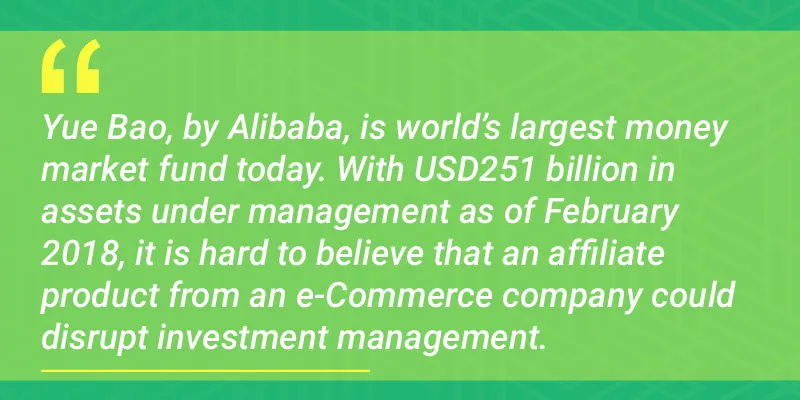
Internal capabilities meet external opportunities
Literature on management broadly classifies corporate strategies into two types – deliberate and emergent. Deliberate strategies are a set of actions that a firm takes with a pre-planned goal in mind –to expand into new products, new geographies, or new ways of doing business. A good example of this could be Microsoft’s renewed emphasis on cloud services under its CEO Satya Nadella, away from its traditional business model of selling software as a packaged product.
Another way in which businesses sometimes explore new sources of strength is by accident or rather, a gradual discovery in the course of their operations. Yue Bao is an example of an emergent corporate strategy. In a country where just 8 percent of the adults have had any access to credit from formal banking channel and where the share of adult population having a formal credit score is even half of that in India (21.4 percent as against the 43 percent in our country), Alibaba was in the unique position of having information on buying habits, cash flows, and creditworthiness of over 400 million active users of its service. Secondly, with massive upgrades in the country’s telecom infrastructure, the cost of purchasing a smartphone and maintaining a data pack was coming down. Between 2010 and 2013, the cost of a 2GB roaming data pack fell from about US$36 to US$17, (a commensurate US data pack costs about U$20). And finally, the escrow service that Alibaba had pioneered in 2003, where the buyer’s money was kept in a safe account until he received goods from a seller in another part of the country and was satisfied with it, had been a great enabler of building trust in ecommerce in general and the brand in particular. As the company diversified into multiple life services – movie booking, travel, sports etc. – more and more people and businesses were comfortable keeping spare cash in digital wallets, given the ease of using the platform to spend on consumer goods and services. These three factors put Alibaba in a powerful position to capitalise on the interest rate liberalisation that the Chinese government was embarking on, to improve resource allocation in the economy.

The Chinese financial market reform
Until July 2013, the government of China maintained strict control over how banks licensed in the country could set interest rates on loans and deposits – often in a manner that was highly loaded against the small saver. The central bank set the benchmark lending rate; state-owned and other licensed banks had to take this lending rate as the floor - any loans, except to government-linked entities, had to be made at rates above this. On the other hand, the central bank also put a cap on deposit rates – savers could not get anything more than 10 percent above the benchmark deposit rate set by the central bank (about 3 percent for a 5-year term deposit), especially if you had less than RMB 10,000 in your bank account – which made you ineligible for any sort of wealth management products issued by local Chinese banks. Indeed, it was these measures which ensured that Chinese banks enjoyed net interest rate margins between 2-3 percent consistently between 2000- 2013, almost in the same range as that for the US, despite the fact that the supply of funds (savings) in China was almost 6-7 times that of the US, which ideally should have brought down the interest rate margins of Chinese banks in the absence of People’s Bank of China’s (PBoC) regulation of lending rates.
However, that changed with the banking reforms undertaken between 2012-13, where the government abolished the lending rate floor to be set for the banks, introduced measures to make it easier for corporates to raise money from the bond markets, and clearly stated that irresponsible banking institutions would be allowed to fail.
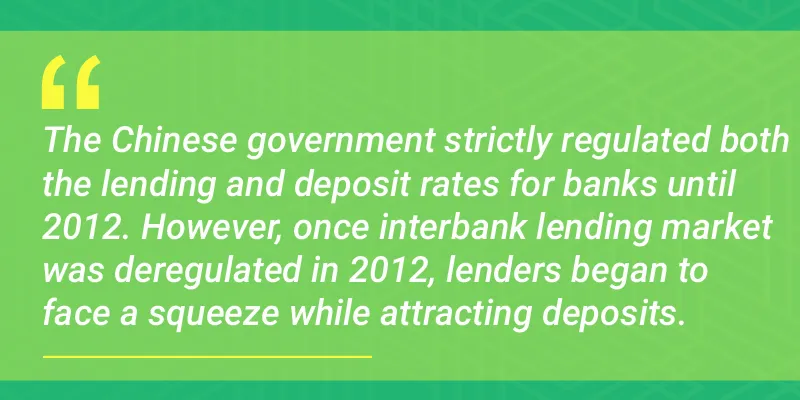
Yue Bao’s story begins in the mad scramble for the interbank deposits or funds that followed these reforms. Immediately following the announcement of these reforms, a number of smaller banks, which had short-term liabilities but long-term loan assets began to feel the liquidity squeezes on a regular basis – particularly around the end of quarter or the festive season when the demand for cash was high. Furthermore, in a break from the past, PBoC governor Zhou Xiaochuan indicated that the central bank would let the financial institutions find market-based solutions to meet their liquidity needs. The time was ripe for someone who had a stable mound of idle cash to lend it to banks, for higher returns. Notably, the government still had not fully liberalised the interest rates in the banking sector – while banks had no floor on their lending rates and had to compete with bond markets to lend to corporate clients, the deposit rate cap was still in place – which meant that they did not have any additional incentive to attract deposits from the public as in the past.
A prodigious start, a resounding endorsement
In June 2013, Alibaba teamed up with Tianhong Asset Management company, a mid-sized asset manager, to form the Tianhong Zenglibao Money Management Fund or Yue Bao, which would be exclusively offered to users of Alibaba’s Alipay payment service. Later, in October Alibaba acquired a 51 percent stake in the company. Tianhong’s task was to allocate investments and administer the funds for Yue Bao.
When it began, Tianhong initially invested up to 90 percent of Yue Bao’s proceeds into “negotiable deposits” with small banks – these were deposits with maturities between 7 days to 3 months, which were intended to help these small banks meet their liquidity needs in the short term. Indeed, in a market where interbank borrowing rates could shoot up in double digits, for smaller banks to accept deposits from Yue Bao at rates of up to 8 percent per annum was still a better option.
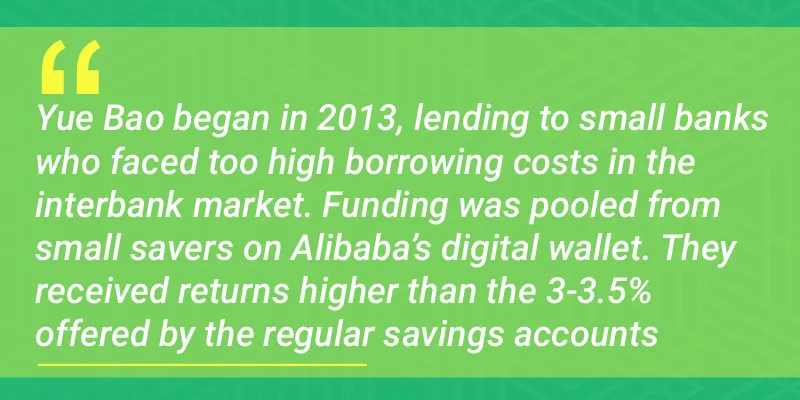
The period between mid-2013 to late 2014, when the People’s Bank of China steadily withdrew liquidity from the interbank markets and tightened monetary policy, was a dream start for Yue Bao. Where depositors could earn not more than 3 percent on their savings accounts in traditional banks, this investment product offered them an average yield of 6.8 percent in the first 18 months of operations. Investing in Yue Bao, to a customer, wasn’t just a matter of putting in idle cash into a digital wallet – people were actively allocating a portion of their salaries to it. Another factor that worked in Alibaba’s favour then was the relatively ambiguity in regulations around what it was doing – as an ecommerce company, its alliance with Tianhong was not under the purview of cash reserve restrictions imposed on Chinese banks, which were required to park about 20 percent of their deposits as reserves with the PBoC.
Sheng Songcheng, PBoC’s head of statistics, claimed in a public interview that the average return that Yue Bao promised its investors would have been a full percentage point lower, had the same reserve restrictions as central banks been applied to the fund’s deposits.
In the regulators’ cross-hairs
The promise of higher returns swelled the fund’s size from US$81 billion at the end of 2013 to US$233 billion by the end of 2017. For a country that prides itself on the virtue of savings, it is an irony that Chinese savers are equally willing to allocate such savings into high yielding investments. Indeed, this phenomenon has been termed by the economists watching China as “the giant rolling ball of cash”, which periodically emerges in bubble wrap fashion in different asset classes – property markets in 2014, corporate bond markets in 2016, wealth management products during 2011-12, and equity markets in 2015. In that sense, even the growth of Yue Bao became another vehicle to cash in on that euphoria of secure high yields, offered by a trusted ecommerce partner. On a larger scale, as the fund grew, its problems were the same as that of the small banks to which it was providing life-saving, short-term cash.
More than 70 percent of Yue Bao’s investments were, by 2015, locked in financial instruments of maturity higher than three months, whereas the Alipay facility backing the investment product offered same-day withdrawal facility to clients. Indeed, the clients who had piled into the fund in the later period simply due to the promise of higher yields, were quick to withdraw funds from their wallet the moment they saw any dip in overnight returns on their investments. By the time Yue Bao rose to become the world’s largest money market fund in 2Q2017, Chinese regulators were expressing their worries about the “unruly growth” in China’s money market funds, of which close to 25 percent was controlled by Yue Bao. The fund held significant investments in deposits for smaller banks and in short-term money market instruments issued by Chinese state-owned companies and policy banks. A massive withdrawal of funds by investors in Yue Bao could potentially be systemically significant, especially with respect to the survival of the aforementioned financial institutions and firms.
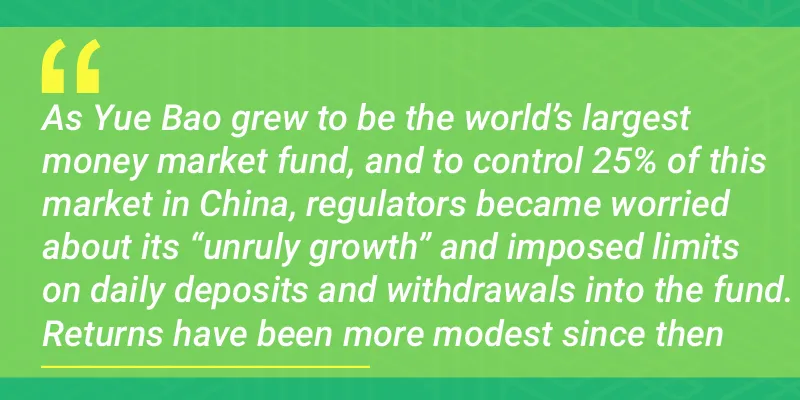
Since late 2017, regulators have forced the fund to reduce its exposure in money market instruments with maturities of greater than one month. The fund has also been pushed to take action against flighty investors – maximum withdrawal limit is set at RMB 50,000 and the maximum amount of funds the investor can transfer in a day has been set at RMB 20,000. Furthermore, there are also limits to the size of an individual investment account (RMB 100,000). These measures have meant that the returns that the fund offers to its investors have gone down to 3.9 percent per annum (6.8 percent in 2014). Indeed, since September 2017, the fund has grown by a mere 1 percent after having grown at a CAGR of 125 percent since its inception. So far as higher returns are concerned, Yue Bao’s story is likely to be more sedate from here on – though the 3.9 percent yield is still better than the 3.3 percent returns that banks in China provide to customers for one-year deposits.
Democratising investment management
For a long while, both in the media and in its self-perception, Yue Bao has been portrayed as a smart investment vehicle, providing returns that are superior to what one can get in the bank. This, in my view, is an example of how firms sometimes misunderstand the source and the reason behind their success and draw wrong lessons from them. Though Yue Bao was an instant beneficiary of the institutional changes and financial market reform happening in China between 2013 and 17, this opportunity was not what made it disruptive. What makes it truly unique is its ability to bring an inclusive wealth management vehicle to people at a minimal transaction cost.
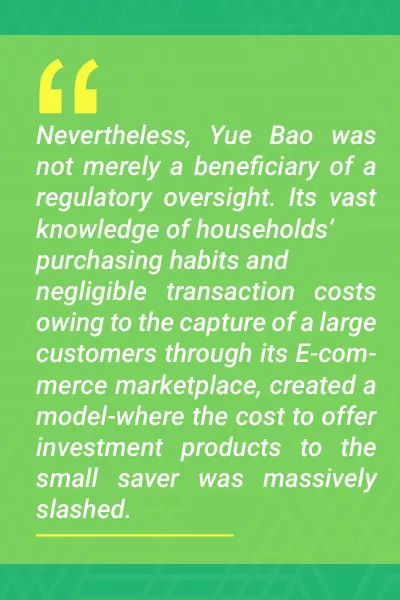
It was then not surprising that the fund began by accepting investment from customers of as little an amount as RMB 1. Purchasing habits, credit offtake (in case of business customers), and a putative credit score had all been a part of Alibaba’s infrastructure as a digital platform for shoppers and businesses. To the firm then, the transaction cost to acquire a customer was nearly zero, given that they were buying just another product – investments – from its platform. Furthermore, given that Yue Bao’s investors were doing more than just buying investments from Alibaba, it gave them a more detailed customer profile and a finer knowledge of their customer’s risk appetite than any independent fund manager would have about its clients, something that I speculate is likely to have driven down its cost of selling investment plans and liquidity risk management.
Learning from Yue Bao’s mistakes

However, later players in the online investment fund marketplace have also learnt from the mistakes of Yue Bao. In particular, they are moving away from a business model where they themselves have to take the trouble of making decisions about where to invest customers’ money in or take the risk of falling into the cross-hairs of Chinese regulators by trying to become a systemically important asset management firm. Tencent, since 2017, has focused on becoming a financial services market place for its clients. It allows investment managers offering different kinds of products – consumer lending, SME loans, money market products- to sell their wares on Licaitong, its wealth management platform. Once again, the sticking point, which allows the customers hassle-free access to its products, is Tencent’s popular messaging service Wechat, which has more than 600 million users in the country. In January this year, Tencent also obtained a licence to officially sell mutual funds on its platform to customers. It looks likely that as Ant Financial and Alibaba curb their ambitions of breakneck growth with regard to Yue Bao, they too will likely follow Tencent’s strategy of being an AI-enabled seller of financial products – rather than being an outright asset management company.
Financial ingenuity under constraints
What are the lessons then, from the story of Yue Bao and the eventual rise of online investment marketplaces in China? If one looks at this entire case in terms of the breakneck growth that Yue Bao enjoyed in its first phase of growth, it is easy to write this off as a peculiarity of the circumstances prevailing in China, and the ability of certain players like Alibaba to exploit the arbitrage opportunities offered by a lack of access for smaller savers to invest their money.
However, the bigger lesson is that of financial ingenuity, of having found the key to offer your clients investment plans with as little initial payment as RMB 1, by building infrastructure for credit assessment, superior risk management and affordable transaction costs – not least in China where banking still remains biased against the common man and regulations still favour the powerful state-owned banks.
India too has all the basic ingredients for enabling a similar revolution – a large population of small savers, a gradually rising penetration of smartphones, and digital payments. Perhaps what is still missing is the existence of an ecommerce platform that captures the wallet of consumers and businesses in as dominant a manner as Alibaba, and a level of trust that is essential to reduce the transaction costs.
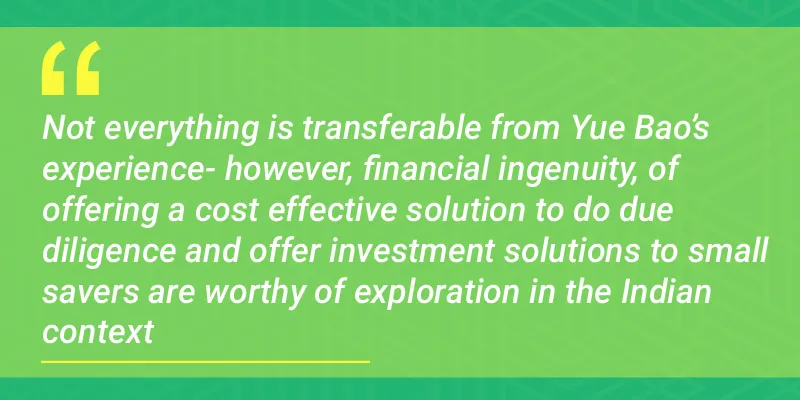
Stay tuned for the next article on this special series on China, only on YourStory.com.
(Disclaimer: The views and opinions expressed in this article are those of the author and do not necessarily reflect the views of YourStory.)







